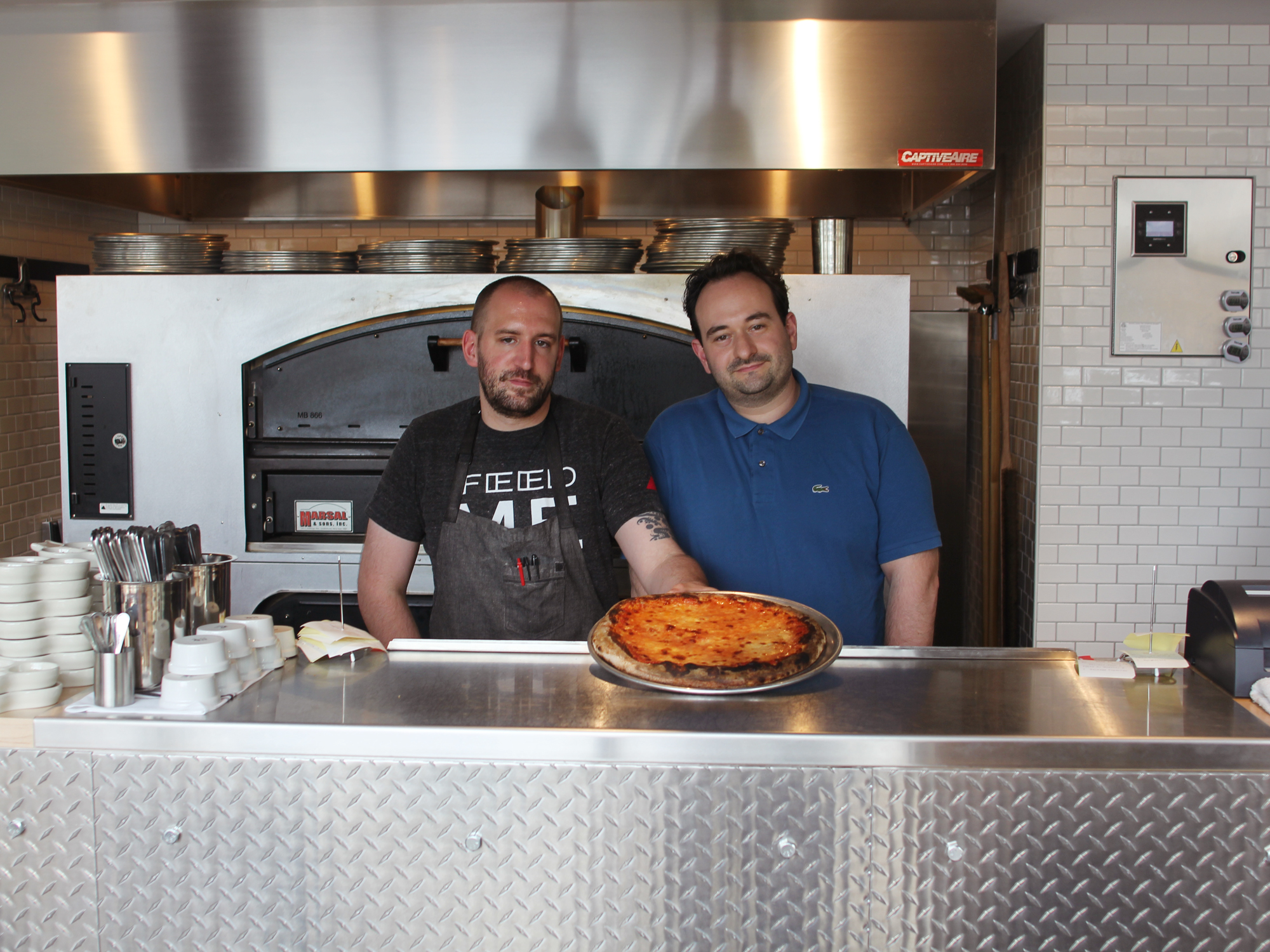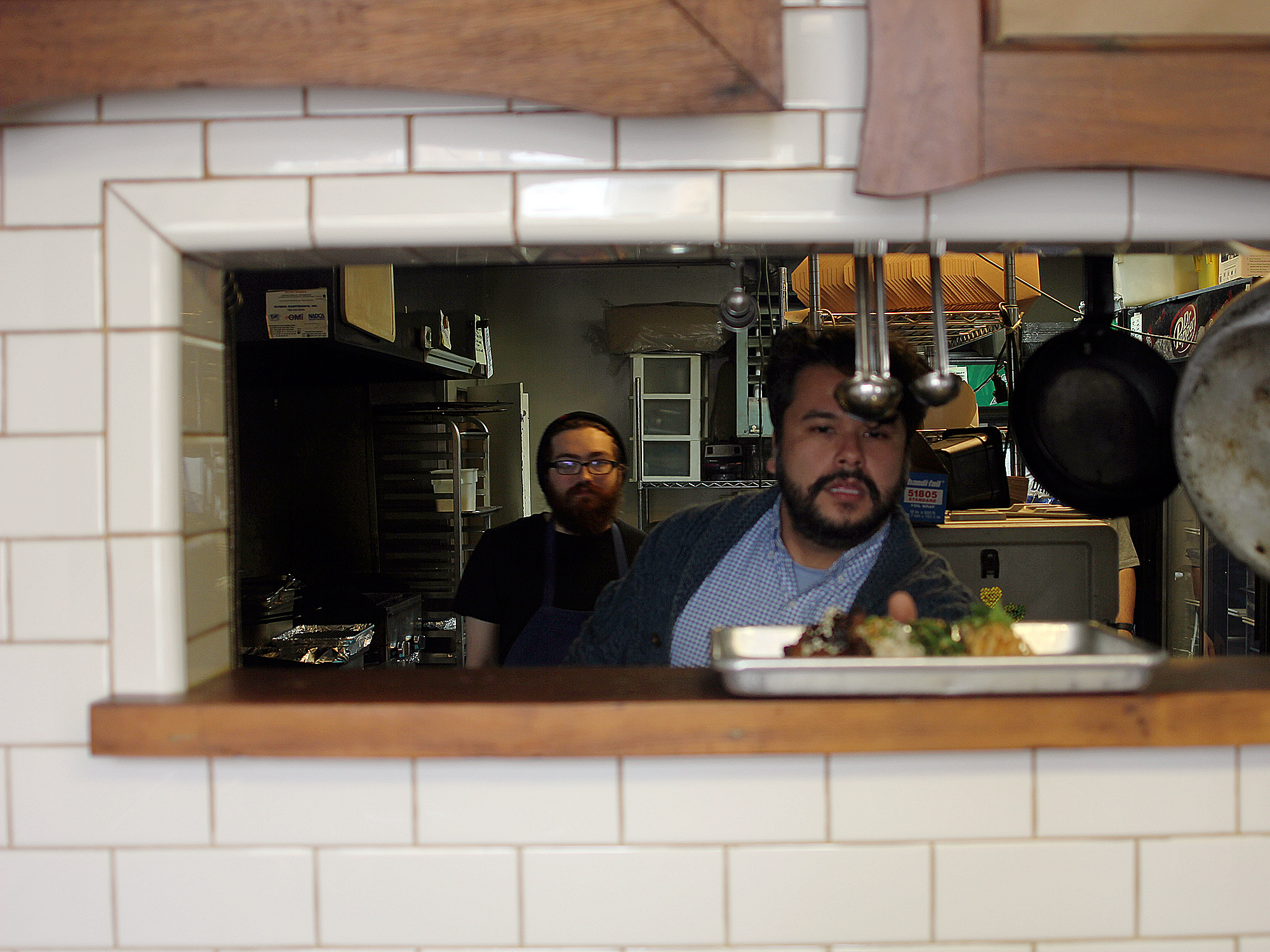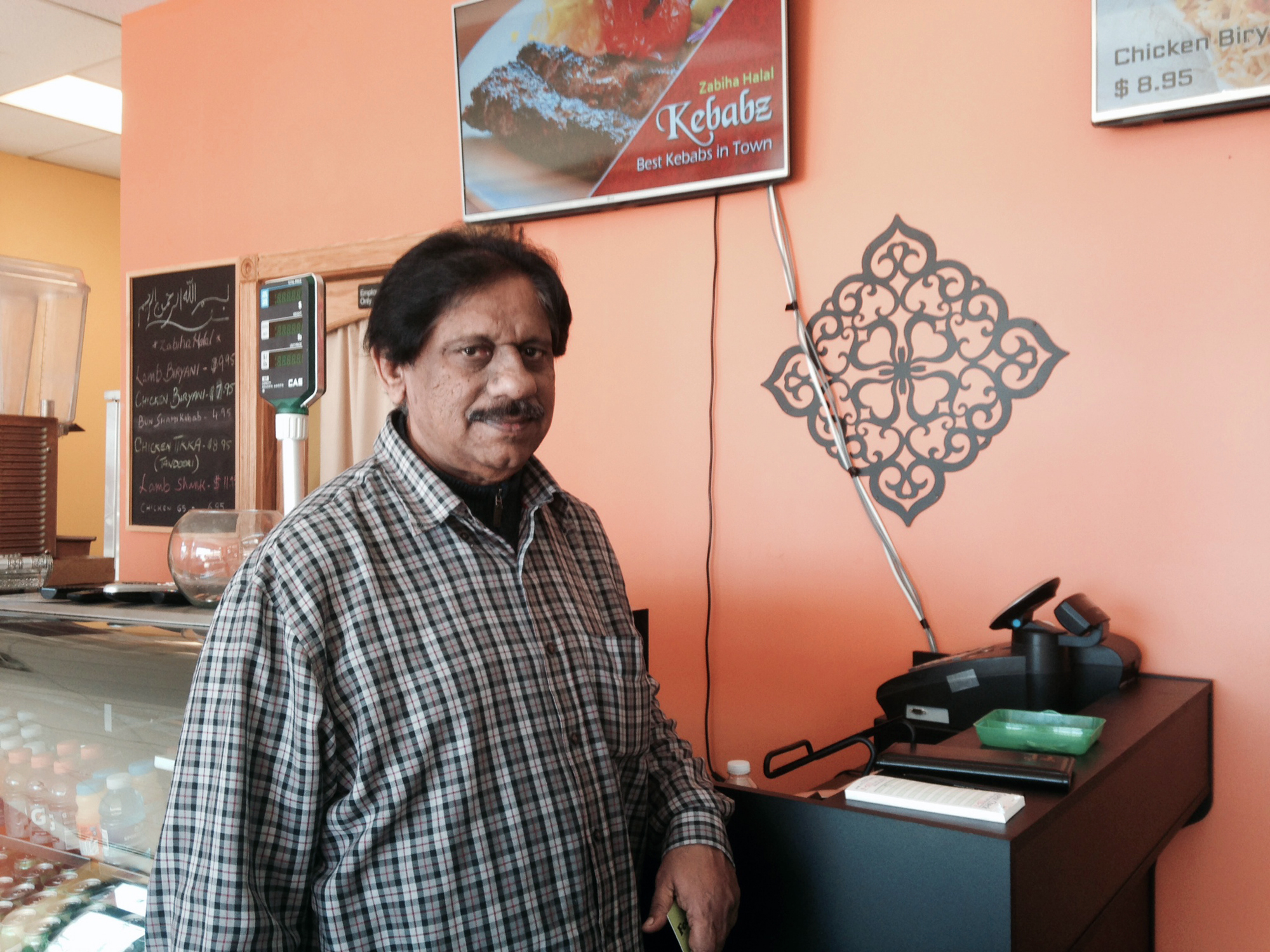IS THERE MORE OF ANYTHING IN CHICAGO than the standard taco stand? They must outnumber gas stations, and even Starbuckses and Subways combined can’t compare. I love tacos, you love tacos, but at times, you yearn to see something different on the scene.
Welcome to something different.
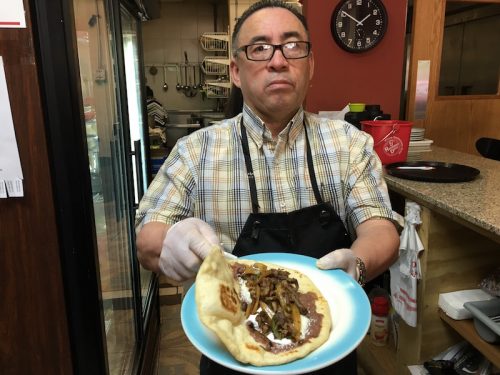 Myles Gebert
Myles Gebert David Velis with a baleada
Baleadas are a form of taco from Honduras. As David Velis explains, they started as poor people’s food, with just cheese and beans, but in America they’re made with all kinds of fillings—when I ask him for a suggestion for my first one to try (as you’ll read later, we had gotten to know each other a bit by that point), he fills it with chorizo, eggs, and sour cream as well as the beans and cheese.
It’s great. It solves two desires at once, because it would be a fantastic breakfast taco (though Velis’s restaurant, Cafe Izalco, is not open at those hours, alas) as well as being a reset button for taco-jadedness—the griddled puffy flour shell is as much pita, or even pizza dough, as it is a tortilla. (The obvious comparison is an Indian or Navajo fry bread taco, but the key difference is that the baleada is not deep-fried.)
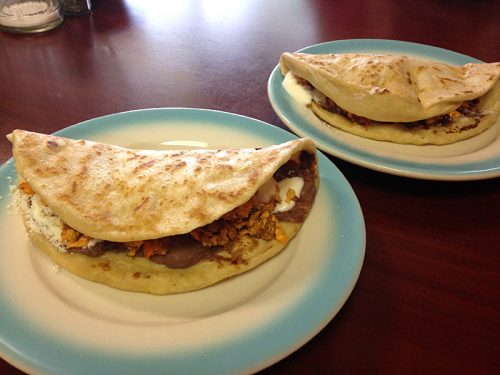
Baleadas with egg, chorizo, beans, cheese and sour cream.
Cafe Izalco isn’t the only place that serves them—searching “baleadas” on Yelp turns out three other locations for them in the city. But it’s worth noting that all of those are within a half mile or so of Cafe Izalco on the northwest side, where most of the city’s central and South American population is located. It’s safe to say that they’re an undiscovered neighborhood specialty.
[su_vimeo url=”http://vimeo.com/219680484″ width=”700″]
A short film about baleadas.
I FIRST HEARD OF BALEADAS WHEN I first went to Cafe Izalco earlier in the month. The menu had two main things on it—pupasas and baleadas. I knew what pupasas were—discs of masa, corn flour, filled with cheese or other things and griddled like pancakes. The national dish of El Salvador, they’re usually eaten topped with cortida, basically a vinegary cole slaw. Imagine a grilled cheese sandwich topped with vinegary slaw, then double how good it is—gooey cheese plus the warm, motherly nourishingness of freshly cooked masa. Cafe Izalco’s were about as good as I’ve ever had.
Baleadas were new to me. And it turned out they’d stay that way—when I asked owner David Velis about them, he said something about the woman who makes them having called in sick on Thursday. (So cruel, to discover something new and be denied it in the same instant!) But I asked if he’d have them the next weekend and he said yes, he’d make them on the next Thursday.
I came back Thursday. It was closed. I came by Friday and Velis said he just didn’t have time to make them because he’d been driving for Uber until 4 in the morning. I came by Saturday and he hadn’t made them yet but he was about to—could I wait about 45 minutes? I didn’t want to put pressure on him when he had other customers, so I said I’d come back Sunday. By Sunday, when my son and I turned up, we were such old friends that Velis gave me a hug.
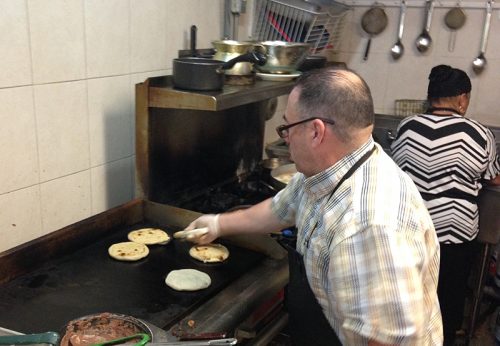
Grilling pupusas
Some might call me obsessive, but as I learned when he invited me back to the kitchen, that made two of us at Cafe Izalco that day. Short but powerfully built and feisty in his beliefs, Velis grew up in San Salvador, El Salvador’s capitol, and emigrated—legally, he points out firmly—in 1973. He’s worked in the restaurant business since 1982, mostly for chains like Burger King and Sizzler, in California and Chicago. Our image of the immigrant business owner is someone who opens a homey place like Cafe Izalco, but in Velis’s case, he kind of came to that by way of a much more quintessential American experience—rising in a corporate environment (he says he was a troubleshooter for Sizzler, the guy they sent to fix underperforming stores) only to leave when new owners came in and decided to screw the managers on their bonuses to save money.
In the early 2000s he had the first Izalco on Lawrence, between Clark and Ashland. It earned a couple of mentions on the old LTHForum then, but I don’t remember it. The Streets and San Man’s Guide to Chicago Eats, published 2004, offers a fond paean to its $5.99 buffet (“Talk about a joint where you could spend a few hours dropping mounds of great chow down your throat”) as well as the variety of offerings Velis was cooking up then—much more than his simple menu now contains.
In El Salvador, only women make the pupusas. But if a man knows how, then the women don’t have him by the balls.
“You make too many things, you can’t do them well,” Velis explains. “I don’t have the staff. Better to make a few things the right way.”
He shows me what he means as he makes an order of pupusas. His kitchen is compact but as organized as any fast food grill, all his ingredients in metal bins or plastic containers in the fridge. He grabs a wad of masa and rolls it into a ball, then starts slapping it with his hands, rotating it as he does to form a perfect round disc with the kind of skill that an expert pizza dough tosser uses to make a perfectly round pie. Along with the visual demonstration, he offers a sociological observation: “In El Salvador, only women make the pupusas. But if a man knows how, then the women don’t have him by the balls.”
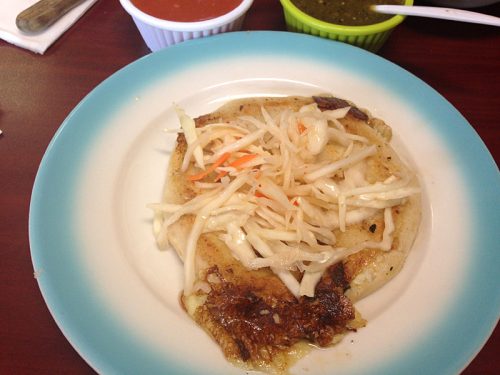
A pupusa, topped with cortida; note the fried cheese.
He takes a small pinch of precooked pork meat and presses it into the middle with his thumb, then does the same with cheese. He pulls up the sides to form a pouch, then flattens it and pats it out again into a disc, slapping it on the grill. It’s a labor-intensive food—each pupusa takes at least two minutes to make, and a typical order is two or three.
But Velis is plainly a man committed to doing things the right way. “This is quality,” he says, of the way he pats out a perfectly round pupusa. “You have to get the thickness just right—too thick and it will burn before the cheese and meat get warm.” He notes a place where the molten cheese has blooped out the side of the pupusa and started caramelizing on the grill. “A little bit like this is okay,” he says, “but too much and the pupusa comes apart.”
I start asking about his original restaurant—and I quickly learn why he sees pupusas in terms of a battle of the sexes. “I got divorced, and I lost it all,” he says. He then tells me about an employee he had who left him suddenly last year—”And I don’t have an attitude as a boss,” he asserts. “But she just walked out on me, before Christmas.”
To be honest, I can see that he might well scare off someone less determined to present his native country’s food in its best possible light. “I am either 100% or zero with people,” he says, and I wait to understand what he means. “If I am for you it is 100%, and I am not in between. If I am finished with you, it goes like that,” visualizing going from 100% to zero with his fists.
He plates the pupusas and hands them off to his one waitress, then offers to show me the making of a baleada. He pulls out a plastic container and I see balls of dough, lined up exactly like the pizza dough at Eataly. “This is the baleada dough. Pupusas are corn, this is flour,” he says. Like a Neapolitan pizza, he taps it out with his fingers on the counter until it is about 10 inches across, then lays it on the grill.
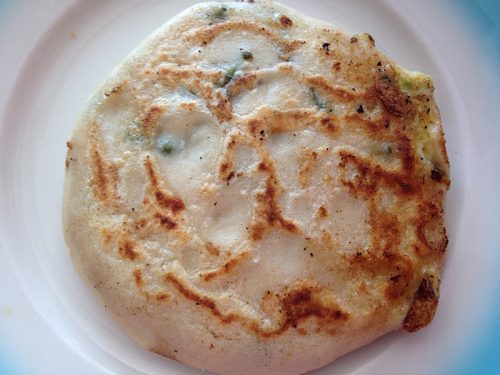
Vegetable pupusa
Within moments, it starts puffing up on the grill, first isolated bubbles, then the whole disc raising itself from the heat. When he turns it over, it is beautifully speckled with brown spots, like the crust of a Neapolitan pizza. “That is quality. When you see that, you know that it’s quality.”
David Velis stands next to this peerless example of the baleada, his chest out with pride. His restaurant may be small, his menu may only have a few things on it, and his determination to do them the best he can may not always result in happiness with the opposite sex. But as sure as any chef in Chicago, he is a man who is determined to make the things he makes, as well as they can be made. He is 100% with baleadas and pupusas.
Michael Gebert is more Sizzler than Burger King as editor of Fooditor.
Latest
Join the Discussion
After you comment, click Post. If you're not already logged in you will be asked to log in or register with Disqus.





